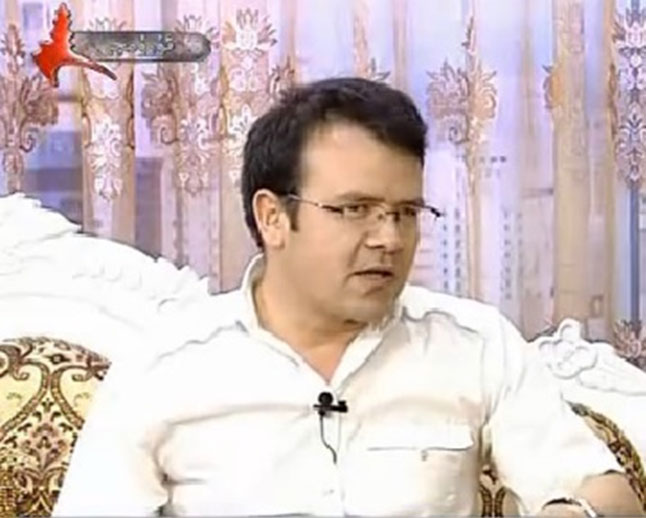
For immediate release
August 27, 2014, 5:30pm EST
Contact: Uyghur American Association +1 (202) 478 1920
The Uyghur American Association (UAA) condemns the sentencing of Uyghur linguist, Abduweli Ayup on charges of “illegal fundraising.” Mr. Ayup was sentenced to 18 months in prison and fined approximately USD 13,000 according to a relative cited in a Radio Free Asia (RFA) article. The sentence was passed on August 21, 2014 after a one-day trial held on July 11, 2014. Based on the verdict, the sentence extends from the date of detention last August.
“There are a number of disturbing aspects to Mr. Ayup’s case. Reports he was denied family visits and accounts of his deteriorating health in custody should set off alarms that the conditions of his detention fell far below international standards and may have influenced the case,” said UAA president, Alim Seytoff in a statement from Washington, DC.
“The Chinese government’s assault on the Uyghur language has been systematic with the establishment of so-called bilingual education in East Turkestan public schools. Now it seems that even individual and private initiatives to protect the Uyghur language are a threat to the Chinese authorities’ assimilative process.”
Mr. Seytoff added: “Punishing peaceful Uyghur scholars, like Abduweli Ayup and Ilham Tohti, who have worked within the Chinese system and entirely within the confines of China's laws, will not foster trust or good relations between the Chinese state and Uyghur people.”
In an article dated August 26, 2014, RFA reported on an interview with a relative of Mr. Ayup, who wished to remain anonymous. The relative informed RFA that Mr. Ayup had been sentenced along with two of his business partners. Dilyar Obul was sentenced to two years imprisonment and ordered to pay a fine of approximately 16,000 USD, while Muhemmet Sidik was fined approximately 21,000 USD and imprisoned for two years and three months. All three men are being held in Urumchi’s Liu Daowan prison, a facility notorious for torture and forced confessions of Uyghur political prisoners.
Abduweli Ayup is a linguist driven by a desire to protect the Uyghur language. Mr. Ayup was awarded a Ford Foundation scholarship to attend the University of Kansas from 2009-2011. After finishing his studies in Kansas, he turned down an opportunity to study for a PhD in order to return to East Turkestan to open a Uyghur language kindergarten and school. He opened a kindergarten in the summer of 2012 in Kashgar; however, by March 2013, Chinese authorities closed it down, even though the school had operated within the confines of Chinese law. Perhaps the greatest indication that the school fell within Chinese law was that it was allowed to reopen in 2014 under close government scrutiny, according to Ayup’s nephew Mirshat in an interview with RFA.
Abduweli Ayup and his business partners were detained on August 20, 2013. In December 2013, family members told Radio Free Asia that Mr. Ayup was in poor health, but authorities had denied him family visits and refused to allow his relatives to supply him with medicine.
On May 17, 2014, the prosecutor’s office of the Tengritagh Region of Urumchi issued a formal letter accusing Mr Ayup of having collected “illegal donations.” According to a New York Times article dated May 11, 2014, Mr. Ayup’s fundraising means included online initiatives, as well as “selling honey and T-shirts emblazoned with the school’s insignia.”
The decline in influence of Uyghur language in East Turkestan is central to the Chinese government’s cultural assimilation of the Uyghur people. Although China’s Constitution and Regional Ethnic Autonomy Law guarantee ethnic minorities the right to use their own languages, Uyghur language medium education has been incrementally phased out.
Chinese officials often portray the Uyghur language as an impediment to the development of the Uyghur people. In 2002, former Xinjiang Party Secretary, Wang Lequan said: “The languages of the minority nationalities have very small capacities and do not contain many of the expressions in modern science and technology, which makes education in these concepts impossible. This is out of step with the 21st Century.”
Also in 2002, the Chinese government launched a “bilingual” education policy in East Turkestan, which has in effect implemented a monolingual Chinese-language based curriculum for Uyghur students. As a result, Uyghur teachers are expected to teach to Uyghur children in Mandarin.
The policy was accelerated in 2010, when authorities announced at the first Xinjiang Work Forum that all schools would complete the shift to Mandarin by 2015, with total fluency achieved in the region by 2020. In May 2014, at the second Xinjiang Work Forum, Chinese president, Xi Jinping emphasized the bilingual education policy as part of an assimilative process of “ethnic mingling.” The forum was preceded by an April 2014 visit by Xi to Kashgar during which he said: “Bilingual education for ethnic minority children has to be taken in hand…By learning Mandarin, it will be easier to find work in the future and, even more important, you can make a bigger contribution to promoting ethnic cohesion.”
